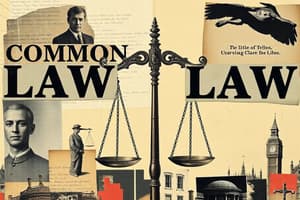Podcast
Questions and Answers
What is a reason why a court judgment may not be included in the legal chain?
What is a reason why a court judgment may not be included in the legal chain?
- It introduces a completely new legal principle.
- It simply applies existing law to new facts. (correct)
- It is quickly accepted by all future courts.
- It is consistently upheld by all jurisdictions.
In civil law jurisdictions, precedents are always binding on future cases.
In civil law jurisdictions, precedents are always binding on future cases.
False (B)
What is the oldest surviving legal code?
What is the oldest surviving legal code?
Code of Hammurabi
The 1804 French Civil Code is also known as the __________.
The 1804 French Civil Code is also known as the __________.
What is a defining feature of the common law system?
What is a defining feature of the common law system?
Equity can completely change the common law system.
Equity can completely change the common law system.
What system is primarily used in Quebec?
What system is primarily used in Quebec?
The principle of __________ means that judges must follow previous judicial decisions.
The principle of __________ means that judges must follow previous judicial decisions.
Match the following types of legal systems with their descriptions:
Match the following types of legal systems with their descriptions:
Which court primarily handles civil and landholding disputes in the common law system?
Which court primarily handles civil and landholding disputes in the common law system?
The Judicature Acts unified the courts in England by simplifying the court procedure.
The Judicature Acts unified the courts in England by simplifying the court procedure.
Name one reason why it is important to learn about other legal systems.
Name one reason why it is important to learn about other legal systems.
Flashcards
Developing Precedent
Developing Precedent
A legal decision that sets a new rule or principle to be followed in future cases with similar facts.
Persuasive Precedent
Persuasive Precedent
Cases with similar facts or legal issues, even if decided in different courts, can be used as guidance. However, they aren't legally binding like precedents.
Binding Precedent
Binding Precedent
A legal decision that is legally binding on all lower courts within the same jurisdiction.
Civil Law
Civil Law
Signup and view all the flashcards
Overruled Decision
Overruled Decision
Signup and view all the flashcards
Common Law
Common Law
Signup and view all the flashcards
Adversarial Court Process
Adversarial Court Process
Signup and view all the flashcards
Customary Law
Customary Law
Signup and view all the flashcards
Following Precedent
Following Precedent
Signup and view all the flashcards
Case Law
Case Law
Signup and view all the flashcards
Mixed or Hybrid Legal System
Mixed or Hybrid Legal System
Signup and view all the flashcards
Stare Decisis
Stare Decisis
Signup and view all the flashcards
Study Notes
Legal Systems Overview
- World legal systems reflect global diversity.
- Comparative law categorizes systems into:
- Common law
- Civil law
- Customary law
- Religious law (e.g., Sharia)
- Indigenous law
- Mixed/hybrid systems
Common Law
- Primarily used in Canada (except Quebec).
- Two primary sources: legislation and case law.
- Key feature: judges follow precedent (stare decisis).
- Pre-1066 England lacked a centralized justice system.
- William the Conqueror's unification led to common law development.
- Curia regis and King's peace
- Royal court system evolved:
- Writ system (common law rules)
- Common Pleas (civil/land), King's Bench (criminal), Exchequer (revenue).
- Equitable justice (separate from common law)
- Court of Chancery provided relief based on fairness principles.
- Writ system (common law rules)
- 1873 Judicature Acts unified courts.
- Canadian provinces have unified superior courts with trial and appeal levels.
- Quebec follows civil law.
- Equity fills gaps in common law, based on fairness, but doesn't change it.
- "Equity follows the law".
Common Law Features
- Precedent use: similar fact/law cases guide decisions ("stare decisis").
- Limits and exceptions exist.
- New precedents can be developed.
- Adversarial process: opposing lawyers present cases without judge interference.
Precedent Development and Application
- New judgments are potential links in the common law chain.
- Many judgments aren't added due to:
- Not adding new law.
- Applying existing law to new facts.
- Later overruled/rejected.
- Ignored despite lack of explicit overruling.
- Superseded by higher court decisions.
Developing New Precedents
- Judges create new precedents if no binding or persuasive precedent exists.
- This happens in cases of:
- Novel issues.
- Old issues in new contexts.
- Relevant factors:
- Similar cases, approaches in other jurisdictions, and policy considerations.
Civil Law
-
Predominant in continental Europe.
-
Primary source: civil code.
-
Precedents used, but not binding.
-
Historical roots: Code of Hammurabi, Justinian's Corpus Juris Civilis, Renaissance interest.
-
The 1804 French Civil Code (Napoleonic Code) influenced Quebec's civil code.
Studying That Suits You
Use AI to generate personalized quizzes and flashcards to suit your learning preferences.




